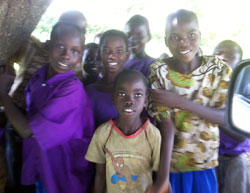 Wherever you travel in Uganda, you will meet schoolchildren.
Wherever you travel in Uganda, you will meet schoolchildren.
In Teso, they are almost always dressed, especially the girls, in the colors of their local primary school: dresses of yellow, green, blue, or purple are the most popular. They almost always walk to and from school on the dusty clay roads. They are unfailingly polite, smiling and curious.
Especially when they have a chance to meet a mzungu.
Mzungu is the universal African word for a white person. It is Kiswahili, but every tribal language I know of has imported it. Some say it comes from a Bantu expression meaning “here and there”, which describes the impression East Africans had of their British colonizers, that they were always rushing up and down. Small children in rural areas of Uganda are particularly smitten by the chance to touch the skin of a white person. They have always been told white people really are ghosts.
When we came off the mountain in Bugondo, we walked into the playground of a school, and it wasn’t a minute before I found myself surrounded by curious children. They ran from everywhere. They couldn’t get enough of me. And as they were all following me and taking my hands, I figured I would run through my entire vocabulary of Ateso.
Ateso is an amazingly beautiful language. It is free of the hard stops, clicks and gutturals of many other African tongues. It has a flow that is gracious, expressive and frank. And it comes with a very definite protocol for just about every social situation. Including this one: Social Situation #27—Mzungu Surrounded by 200 Unknown Schoolchildren. Language is liturgy. So here we go.
Me: Yoga! Yoga Noi! (Hello! Hi, there!)
They (in unison): Yoga!! (Back atcha, and where did you learn that?)
Me: Biyaibo? Biyaibo re’? (How’s it going? How are things at home?)
They: Tamit! (pronounced tah MEET. It’s all good! Fine! Sweet!)
Me: Tamit! Ejokuna! (Great! Good for you!)
They: Ebo! (pronounced, in a sort of sighing, comforting way, AY-bo. You are most welcome.)
Me: Eyalama. Eyalama noi. (Gee, thanks! Thanks a lot!)
This is the point at which you hope you will be getting in your car and no child will have the chance to ask you a detailed question about how your goats are doing, or whether the white in your skin ever rubs off.
There is one other custom that happens especially in the countryside, which Americans especially find disturbing. Girls, as they take a man’s and sometimes a woman’s hand in this exchange, go down on one knee in a sign of respect. At first I was totally flustered. But I have since seen it is only part of a complex web of authority and nurture that characterizes the intensely Christian Iteso society. The elderly, of both sexes, are at the top of a sort of elastic pyramid of esteem, whose purpose is to connect us all to each other in ways we can’t get away from. The little girl who kneels is saying, You cannot get rid of me. You cannot walk away from me like a tourist. You belong to me, because we all belong to God.
